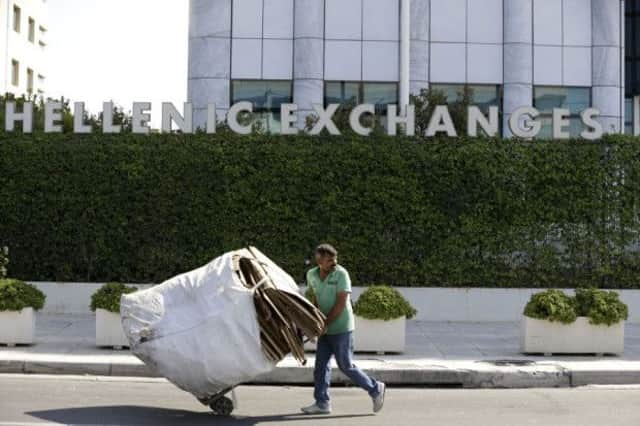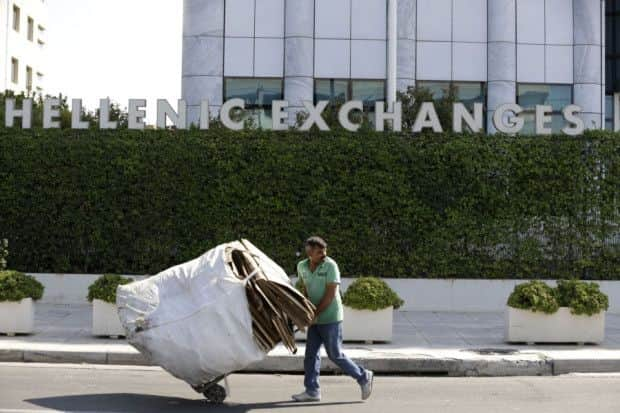BusinessTalk TV and Q&A on the crisis in Greece


In the latest edition of Business Talk TV, we ask the question: Is a Grexit now inevitable? And will it lead to economic chaos?
Deputy Business Editor Greg Wright is joined by Iain Clacher, an associate professor at Leeds University Business School.
• Why is Greece teetering on the financial brink?
Advertisement
Hide AdAdvertisement
Hide Ad

Heavily indebted Greece has long been receiving financial bailouts from the eurozone. Now it risks being declared in default if it fails to meet a debt repayment of 1.6 billion euro (£1.1 billion) to the International Monetary Fund (IMF) tomorrow.
The repayment is believed to depend on receipt of the latest tranche of a eurozone bailout fund, which is itself being made conditional on Athens accepting new austerity measures.
But on Saturday the European Central Bank (ECB) decided not to extend emergency finance to Greek banks after talks broke down.
If Greece fails to meet its deadline it will be declared in default, pushing it towards the exit door from the single currency.
Advertisement
Hide AdAdvertisement
Hide Ad• What has happened since Greece’s financial lifeline was cut off?
After the ECB’s decision Greece announced its banks would be shut until July 6, and the government has made public transport free while the banks are closed. Cash machines are open, but customers can withdraw only 60 euros (£42) a day, with reports that only 40% of ATMs have any money left in them.
Greek Prime Minister Alexis Tsipras has forcefully condemned the bailout terms proposed by the IMF and ECB as being “not viable” as a long-term solution for his country, and following the ECB decision he announced a snap referendum, scheduled for July 5, on whether to accept or reject the austerity measures being put forward.
Prime Minister David Cameron has said the poll on Sunday will essentially amount to an “in/out” vote on whether Greece should leave the eurozone.
Advertisement
Hide AdAdvertisement
Hide AdEuropean Commission president Jean-Claude Juncker warned that a ‘no’ vote would be seen by the rest of the world as a “signal that Greek wants to distance itself from the eurozone and from Europe”.
He said: “This is not a game of liar’s poker. There is not a winner and a loser; either everyone wins or everyone loses.”
Mr Tsipras has called for “patience and composure” from his countrymen, assuring them their deposits are fully secure, while wage and pension payments are guaranteed.
• What impact has it had on the markets?
The FTSE 100 Index plummeted almost 2% to 6626.3 in early trading today, while France’s Cac40 and Germany’s Dax were both more than 3% down. The pound was one cent up against the euro at just under 1.42.
• Should people going on holiday to Greece be worried?
Advertisement
Hide AdAdvertisement
Hide AdAround two million Britons make tourist trips to Greece every year. Those travelling this summer are being advised to take enough euros in cash to last their entire holiday and cover any emergencies as cash machines in the country are swiftly being emptied.
Tourists should also have credit and debit cards as a back-up, but there are worries that small retailers such as cafes, restaurants and bars may not accept cards as they desperately seek to hold on to cash.
Cash withdrawals from ATMs in Greece have been limited to 60 euro (£42) a day. This limit is only intended for accounts linked to Greek banks, and tourists should be able to take out up to their normal daily card limit, but there are warnings that cash machines may automatically impose a 60 euro limit.
Tourists are urged to have travel insurance that will cover them for travel disruption and delays that could arise from civil action such as strikes, and they should also be aware of the possibility of hotels and businesses going under during the summer.
Advertisement
Hide AdAdvertisement
Hide AdGreece’s government has promised that tourists currently in the country and those planning to visit will not be affected by the financial crisis, and deputy tourism minister Elena Kountoura said people travelling will be able to enjoy their holiday “without any problems whatsoever”.
• So how much should I take on my holiday?
It all depends on how much has been pre-paid for in your holiday - whether it is all-inclusive, part-board or room only.
But if you want to have a good time in Greece or one of its holiday islands such as Crete or Corfu, the advice is to pack plenty of cash.
Andrew Brown, from Post Office Travel Money, said: “Split your cash between family members, so that no one person is carrying too much. Once you arrive in your destination, use safes and deposit boxes to store cash, so you are never carrying too much around with you.”
And if you are unsure how much to take, Post Office Travel Money has come up with a handy guide on what basics might cost in various holiday hotspots: